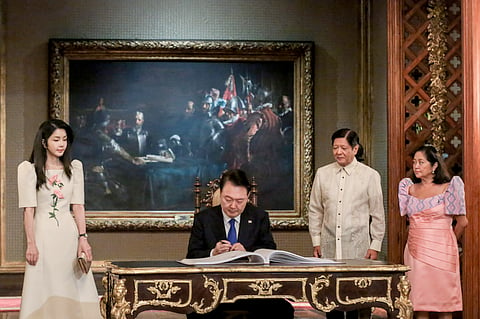
- NEWS
- the EDIT
- COMMENTARY
- BUSINESS
- LIFE
- SHOW
- ACTION
- GLOBAL GOALS
- SNAPS
- DYARYO TIRADA
- MORE

President Ferdinand Marcos Jr. and South Korean President Yoon Suk Yeol on Monday oversaw the signing of several agreements between the two countries on maritime cooperation, infrastructure and energy development.
Yoon’s state visit coincides with the 75th anniversary of diplomatic relations between the Philippines and South Korea. Yoon was accompanied by his wife, Kim Keon-hee, who was greeted by First Lady Liza Araneta-Marcos.
In his speech, Marcos highlighted the shared history of Manila and Seoul, emphasizing their common values and the sacrifices of the Filipinos who came to South Korea’s aid during the Korean War in 1950.
“Our bonds have continued to grow since then. Today, we have a robust partnership in defense, security, maritime cooperation, trade, development and people-to-people exchanges,” he said.
The two nations agreed to elevate their relationship to a Strategic Partnership.
“The time has come for us to elevate the ties between the Philippines and the Republic of Korea,” Marcos said, noting the need to “work together to achieve prosperity for our peoples and to promote a rules-based order governed by international law, including the 1982 UNCLOS and the binding 2016 Arbitral Award.”
Yoon expressed hope that his visit would enhance trade and economic cooperation, broadening the partnership to include sectors like security, digital technology, and energy. “I look forward to fruitful discussions on ways to advance our bilateral cooperation,” he said.
Among the signed agreements was a Memorandum of Understanding (MoU) between the Philippine Coast Guard and the Korea Coast Guard aimed at strengthening maritime security.
“Based on the MoU signed today, our two countries will reinforce our maritime security partnership, addressing transnational crime, information sharing, and search and rescue missions,” Yoon said at a joint press conference with Marcos.
Both leaders emphasized the importance of a rules-based international order, particularly regarding the South China Sea. “We share a common understanding about the importance of peace, stability, and safety in the South China Sea, a critical sea lane in the region,” Yoon said.
Economic gains
To boost trade and investment, Marcos pledged to implement the Free Trade Agreement (FTA) with South Korea, which reduces or eliminates tariffs on key products such as agricultural goods, electronics and automotive components.
Yoon emphasized the need to implement the FTA as soon as possible. “President Marcos and I agreed to work together to deliver tangible benefits to our citizens by enhancing economic cooperation. We are committed to bringing the Korea-Philippines FTA into force at the earliest date,” he said.
Marcos also expressed the Philippines’ readiness to welcome investments from South Korean companies. “We are continuously finding ways to make the Philippines a more conducive place to do business and are accelerating policy reforms to improve our business environment,” he said during the Philippines-Korea Business Forum at the Manila Hotel.
The two countries are also focusing on the feasibility study of the Bataan Nuclear Power Plant (BNPP).
According to the Department of Energy (DoE), the Korea Hydro and Nuclear Power Co. Ltd. (KHNP) will lead the study set to begin in January 2025. This follows previous studies conducted in 2008 and 2017.
“This study will assess the feasibility, safety and sustainability of various nuclear energy options, helping the government make informed decisions aligned with the country’s long-term energy goals,” the DoE said.
The DoE clarified that the Philippine government is under no legal obligation to proceed with the BNPP rehabilitation based on the study’s findings. “The study is exploratory and any subsequent actions will be subject to further evaluation and decision by the government,” it added.
Marcos and Yoon witnessed the signing of an MoU between the DoE and the KHNP, which aims to guide the Philippine government’s decisions on the BNPP and explore other nuclear technologies.
Under Executive Order 164 (2022), the Philippines aims to integrate nuclear energy into its power mix, targeting the operation of its first nuclear power plants by 2032 with an initial capacity of 1,200 megawatts, expanding to 4,800 megawatts by 2050.
